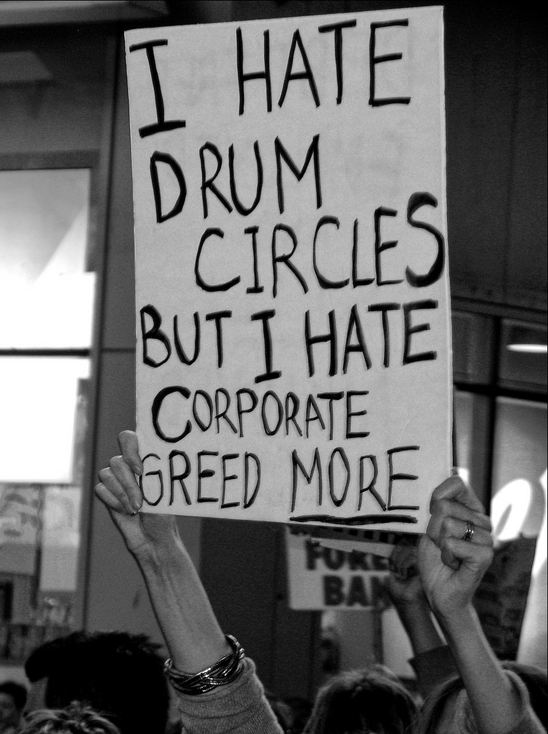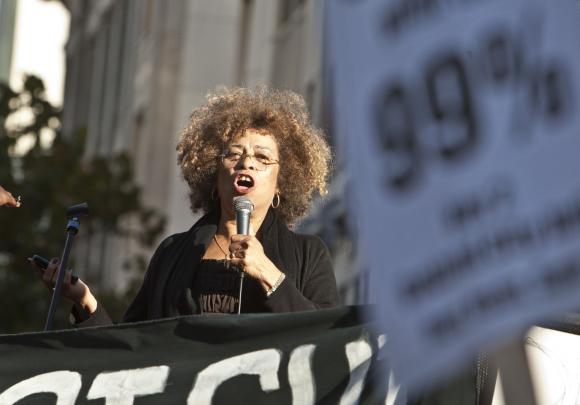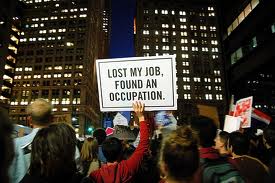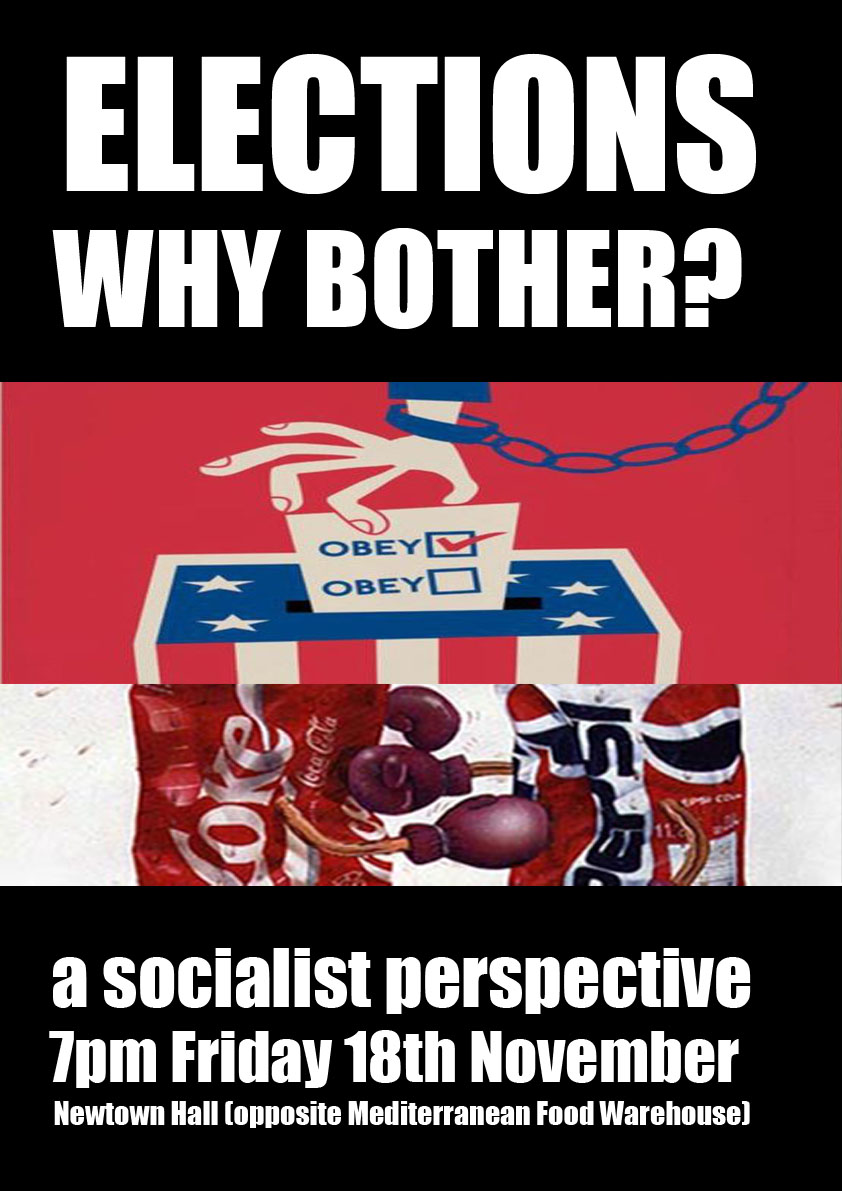
Byron Clark
A man with long blonde dreadlocks leads a procession of about 140 other people down am almost carless street. The crowd is predominantly young, cosmopolitan in its make up, and colourful in its outfits. Some sort of parade? No, the blonde dredlocks are under a hardhat, which complements the high visibility jacket and steelcap boots. This man works as a labourer in Christchurch’s red zone, part of the highly casualised and underpaid workforce that has been demolishing damaged buildings and making the city safe for new ones. He has been asked by the others in the group to lead up front in his PPE gear to symbolise what the protest is about. Its Labour day, and Christchurch is experiencing its first Labour day march is years (possibly decades) and it was organised by the Occupy Movement.
At the end of the march an open mic is held. A university graduate talks about how he is working two jobs but still under a mountain of debt. A young woman talks about an injury she sustained as a result of understaffing in a previous workplace. A number of young workers tell similar stories, and a member of the Nurses Organisation tells the assembled crowd that she will do what she can to get her union to endorse this movement. Two other unions- Unite and the RMTU- already have.
While a number of different view points and ideologies are present in the occupy camps (and in the much larger groups that attend the protests they call) this movement is at its core one based on class. The occupy protesters around New Zealand have raised hundreds of dollars for the locked out meat workers employed by Canterbury Meat Packers, and in Christchurch a lively picket was held. The people who are camping in public spaces know which side they’re on when a company attempts to cut staff pay by 30% and uses a lockout to achieve this.
Continue reading “Just a bunch of hippies?”
Safer Spaces in the Occupy Together movement
article by Ian Anderson and Stacey Nylund, originally published in Issue 5 of the Occupied Dominion Post.
How can we be together in a unity that is not simplistic, that is not oppressive, that is rather complex and emancipatory?
-Angela Davis, Occupy Wall Street
 By occupying spaces in the middle of major cities, we all take risks. We’ve seen the women maced on Wall Street, the mounted division charging in on Occupy Melbourne; we’re aware that eviction is a possibility, relieved when it’s averted; these are necessary risks to make our statement.
By occupying spaces in the middle of major cities, we all take risks. We’ve seen the women maced on Wall Street, the mounted division charging in on Occupy Melbourne; we’re aware that eviction is a possibility, relieved when it’s averted; these are necessary risks to make our statement.
But there are other risks associated with this movement, internal rather than external threats. Reports of rape in Cleveland and Glasgow circulate online. Occupiers in Wellington debate how to react to the presence of fascists in the city, and potentially at the occupation itself. It’s become increasingly obvious that by including those who behave oppressively, we automatically exclude others.
Continue reading “Safer Spaces in the Occupy Together movement”
Elections: why bother?
The Workers Party is supporting Mana this election, after standing down from national elections. But why do 1 in 4 young people choose not to vote? Isn’t that a rational choice given the options? Can a capitalist Westminster system really represent the majority?
A socialist perspective on why we participate in elections, followed by kai & korero.
Tonight (Friday) 7pm
Newtown Hall (opposite Mediterranean Food Warehouse)
Occupy Wellington: what is the 99?
 Sunday: 13/11/11 2:30pm
Sunday: 13/11/11 2:30pm
Location:
Free University,
Jack Illiot Green,
Civic Square
Wellington, New Zealand
What is the 99%?
Who is the 99%?
Possibly the best agitational slogan to come forward in the past 30 years from the left, too often in the occupy upsurge this idea has been taken at face value, something which undermines the slogan itself. The 99% represents decades of struggle and thinking around the idea of the haves and the have nots, workers and capitalists, the many and few. If we are going to make full use of the powerful potential contained within the idea represented by the 99%, then we need to know what it means, to discuss and understand the connotations and challenges that are summed up in such a pithy statement.
This is a public workshop as part of the Free University being held on Sunday.
Occupied Dominion Post: first sitting of the People's Parliament
Originally published in Issue 3 of the Occupied Dominion Post.
Friday 11.11.11 is the first sitting of the Participatory Peoples’ Parliament at 5:30pm.
It’s about democracy for the people, by the people. So join the G7 Billion!
Followed by a weekend of:
Saturday
2:30: Global Occupy Rundown
3:30: General Assembly
5:30: Music
Sunday
Real free-trade
11am: Revolution in the Middle East (Tali Williams)
Midday: The Situation in Africa (Yilma Tasere)
1pm: What is the 99% (Joel Cosgrove)
2pm: Occupied Europe (Paco)
3pm: Music
Occupied Dominion Post: letter to the editor
 Originally printed in Issue 2 of the Occupied Dominion Post, publication by members of Occupy Wellington.
Originally printed in Issue 2 of the Occupied Dominion Post, publication by members of Occupy Wellington.
A recent (Unoccupied) Dominion Post opinion poll presented readers with the choices of supporting Occupy Wellington, or agreeing that “they need to get jobs.” Coupled with generally unsympathetic coverage from the capitalist press, this raised the hackles of some occupiers. At the Occupy Wellington Labour Day march, occupiers carried placard stating “I have a job and an occupation” or “I have two jobs, university and an occupation” – variations on the placard “I lost my job, found an occupation.”
The Occupy Together movement draws in supporters from diverse backgrounds, with a range of employment situations. Many of the core organisers have other commitments, including work and study. Those with full-time work and families may not have the time or energy for urban camping – so they support the movement by donating food or resources, by organising workshops, by coming to General Assemblies. This movement is a broad church.
More to the point, unemployment is a product of the system Occupy Together collectively challenges. Capitalism requires a reserve army of labour, a pool of unemployed workers to keep the labour market competitive. Under neoliberalism – the late stage of capitalism typified by cuts, privatisations and “free market” reform – structural unemployment is used to keep wages down.
The Alister Barry documentary In A Land of Plenty explores how during neoliberal reform, the Reserve Bank used interest rates as a way of keeping unemployment high – and wages low. Suzanne Snivelly, member of the Reserve Bank Board of Directors during the crucial reform period of 1985-1992 states:
“It was a manageable thing for the Reserve Bank to use employment, and unemployment, as the way to get wages down. It was far easier than any other means of getting inflation down. So they used it.”
By demonising occupiers as unemployed layabouts, the DomPost conveniently misses the point: whether or employed or unemployed, we have valid grievances. Capitalists attack the class as a whole – declining real wages, structural unemployment and benefit cuts are all part of the same package. We must counter these attacks with solidarity, unity and inclusiveness. From factory floors, to desks, to WINZ offices – we are the 99%.
-Ian
Occupied Dominion Post: editorial
Let’s get something straight: this movement has issued no demands. It is not a protest. It’s an occupation. Rebellions don’t have demands.
 The above statement is from issue two of the Occupy Wall St Journal and in that spirit we are currently occupying the heart of our city. We’ve set up our tents and kitchens, we’ve put up our banners, and we are refusing to leave. As we reclaim the city we are reclaiming our own minds.
The above statement is from issue two of the Occupy Wall St Journal and in that spirit we are currently occupying the heart of our city. We’ve set up our tents and kitchens, we’ve put up our banners, and we are refusing to leave. As we reclaim the city we are reclaiming our own minds.
We are not just a handful of dreamers – we are realists. We are not stupid – we know something is very, very wrong with the world. We are not cowards – we are stepping up and putting ourselves forward to take part in this movement. We are not naïve – we know the problem is not a few greedy people ruining the system, the problem is a system based on greed that ruins people.
We are not alone. We are all over the world. In hundreds of cities on every continent, we are sharing tents, sharing food, sharing ideas and imagining a world where we share everything. We are trying to change it all from the bottom up. We are the 99%. Continue reading “Occupied Dominion Post: editorial”
Australian Labor Party: "They'd send police to fight the unions that supported them"

Workers Party member Ian Anderson interviews socialist Stephen Jolly, on the Labor Party and recent union elections.
The Spark: Socialist Party recently committed to helping with the Electrical Trades Union (ETU) election, can you tell me why that was?
SJ: The Victorian branch of the ETU is probably the most militant trade union in Australia. When Dean Miles the current state secretary took over in the 1990s, workers on building sites were almost embarrassed to admit they were electricians. Now they’re the highest paid, best organised, and work the shortest week of any construction workers in Victoria – in an industry that’s 100% unionised, so that’s quite something.
And secondly, he’s taken the union out of the clutches of the Labor Party. The leadership organised an internal referendum to ask the members if they wanted to stay affiliated and by overwhelming majority of over 80%, they said no, we want to be independent of the Labor Party. At election time the ETU give election funds sometimes to the Greens, sometimes to what they consider better Labor candidates, and also to the Socialist Party.
We think they should go one step further, and work to create a new workers’ party.
Continue reading “Australian Labor Party: "They'd send police to fight the unions that supported them"”
Right to Strike in Australia
Workers Party member Ian Anderson interviews veteran Australian union activist Dave Kieran, on the recently launched Right To Strike Campaign.
 The Spark: If you could start with a basic overview of the Right to Strike campaign, and how it started.
The Spark: If you could start with a basic overview of the Right to Strike campaign, and how it started.
DK: The right to strike campaign began about a fortnight ago in its current form, where 6 unions attended a meeting to establish a national campaign, and to work practically towards resolutions in workplaces, up through unions and union executives, approach civil society and civil movements, faith-based communities etc seeking similar resolutions of support.
It’s based very much on the International Labour Organisation (ILO) framework, which indicates that the right to strike actually underpins the will of the people; that is, all of our other rights are protected by the right to strike. Certainly industrially, things like the right to organise, right of entry, are protected by the right to strike. Continue reading “Right to Strike in Australia”
We Are The University (Auckland) demands
[youtube http://www.youtube.com/watch?v=fWp-C5_169U]
After occupying a university council meeting room on Monday the 17th of October, We are the University came to these conclusions in a democratic process:
1. Free education, Zero Frees (Unconditional).
2. Sack Stuart McCutcheon and Patrick Walsh as vice chancellors of the University of Auckland and Victoria University respectively. Restructure university in a public forum.
3. Remove trespass orders on Marcus Coverdale and Wikatana Popata.
4. Decisions on courses be based on scholarly and social benefits rather than financial.
5. Security guards be employed for the safety of students, not survailliance. Cops not to be called in response to (non-violent) student activism.
6. The University management be bound by the government facilitation with the Tertiary Education Union (TEU).
7. University actively lobby to revoke the VSM bill
8. Government unconditionally fund student unions, allowing them to be a critical voice and conscience of society, so that corporatisation such as advertising is not necessary on campus spaces.
– We are the University Auckland

